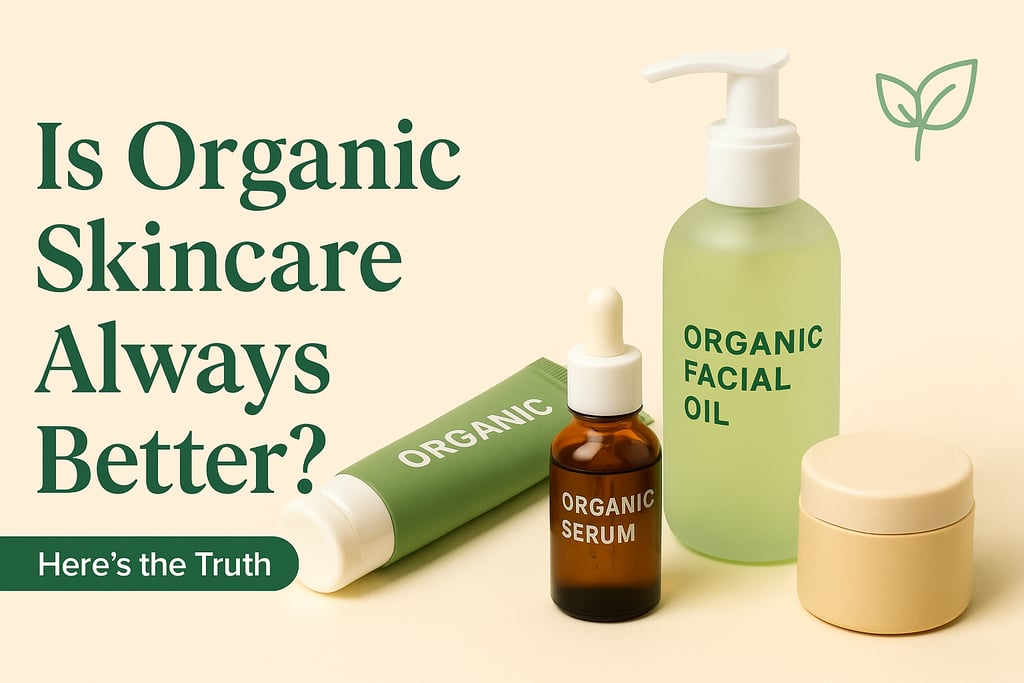Is Organic Skincare Always Better? Here’s the Truth
When you see the word organic on a skincare label, it instantly sounds healthier, purer, and safer — right? But is organic skincare always better? Or is it just a marketing buzzword wrapped in pretty green packaging? Let’s break it down.
7/30/20252 min read


Is Organic Skincare Always Better? Here’s the Truth
When you see the word organic on a skincare label, it instantly sounds healthier, purer, and safer — right? But is organic skincare always better? Or is it just a marketing buzzword wrapped in pretty green packaging?
Let’s break it down.
What Does “Organic” Really Mean in Skincare?
Unlike organic produce, skincare isn’t always regulated the same way. In most countries, a product labeled “organic” typically means it contains ingredients that were grown without synthetic pesticides or GMOs.
But here’s the catch — a product can still be labeled “organic” even if only a certain percentage of its ingredients meet that standard.
There’s also a difference between:
100% Organic (every ingredient is organic)
Certified Organic (a regulated percentage is organic)
Made with Organic Ingredients (only some parts are organic)
So yes, not all “organic” skincare is created equal.
The Good: Why Organic Skincare Is Worth Considering
There are real benefits to going organic, especially if:
You have sensitive skin that reacts to harsh chemicals.
You care about eco-friendly farming and sustainability.
You want fewer synthetic additives, fragrances, or preservatives.
Many organic products use plant-based ingredients that are naturally rich in antioxidants, vitamins, and essential oils — and that can be great for your skin.
The Not-So-Good: When Organic Doesn’t Mean Better
Here’s what most people don’t realize:
Natural isn’t always gentle — Essential oils, for example, can be irritating.
Organic doesn’t equal effective — Some lab-created ingredients are safer and more stable than their “natural” counterparts.
Shelf life matters — Organic products often have shorter expiration dates and may require extra care in storage.
In short: Just because it’s organic doesn’t mean it’s automatically better for your skin.
How to Shop Smarter (Organic or Not)
When choosing skincare, look beyond the label:
Read the ingredient list, not just the front of the bottle.
Know your skin type — what works for dry skin may not work for oily or acne-prone skin.
Look for brands that are transparent about sourcing and formulation.
Want to go organic? That’s great — just choose products that are well-formulated and suited to your needs.
Final Thoughts: It’s About What Works for You
Organic skincare can be amazing — but it’s not a magic solution.
Sometimes, a thoughtfully formulated non-organic product can work wonders.
Instead of obsessing over labels, focus on what your skin is telling you.
Because in the end, the best skincare is the one that makes you feel good — inside and out.
✅ Tip from Dealaha: Always patch test new products and consult a dermatologist if you’re unsure. Clean, conscious skincare is about balance — not extremes.
Quality You Can Trust
Discover handpicked, high-quality products that support a healthier, more intentional lifestyle.
Contact
Stay in the Loop
© 2025 Dealaha™ All rights reserved.
